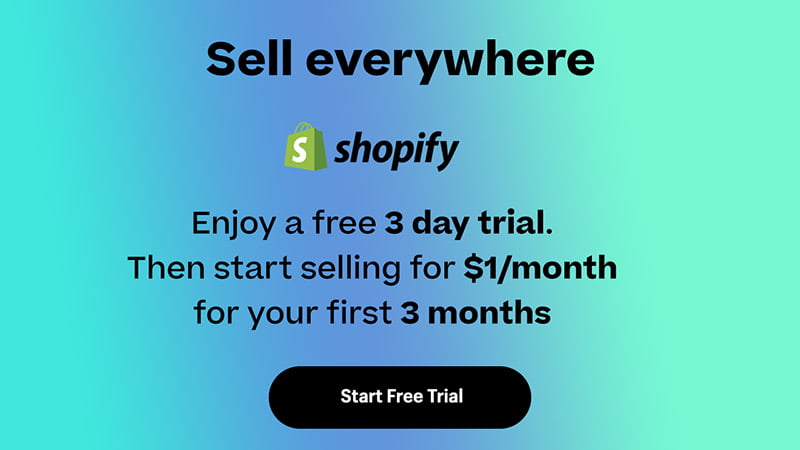Disclosure: We may earn a commission or fee from some of the links in our content. However, this does not affect our recommendations. Learn more.
Printify and Apliiq are two well-known names in the print-on-demand (POD) space — but which one comes out on top?
After years of testing and reviewing POD platforms, I’ve thoroughly evaluated both Printify and Apliiq across branding, product variety, pricing, shipping, and more.
In this in-depth comparison, I’ll show you which platform is best for your goals — whether you’re running a general store or launching a high-end clothing brand.
Printify vs Apliiq: Quick Verdict
Printify – Best for beginners and general ecommerce sellers
Apliiq – Best for branded clothing lines and streetwear
In this comparison, I’ll break down how these two platforms perform across key areas — including product quality, customization options, pricing, and long-term scalability.
This article was updated on 08/20/25. All platform data, pricing, and features were re-verified for accuracy.
Quick Comparison: Printify vs Apliiq
Here’s a quick look at how Printify and Apliiq stack up side-by-side:
| Feature | Printify | Apliiq |
|---|---|---|
| Fulfillment | Third-party network | In-house (US-based) |
| Product Range | 750+ items | Apparel only |
| Branding | Limited | Full private-label options |
| Production Speed | 2–7 days (varies) | 5–7 days |
| Integrations | Shopify, Etsy, eBay, more | Shopify only |
| Customization | Basic design uploads | Embroidery, labels, appliqué |
| Ideal For | Testing products, fast setup | Branded fashion and streetwear |
| Global Reach | International providers | US-only fulfillment |
Best for Product Variety: Printify
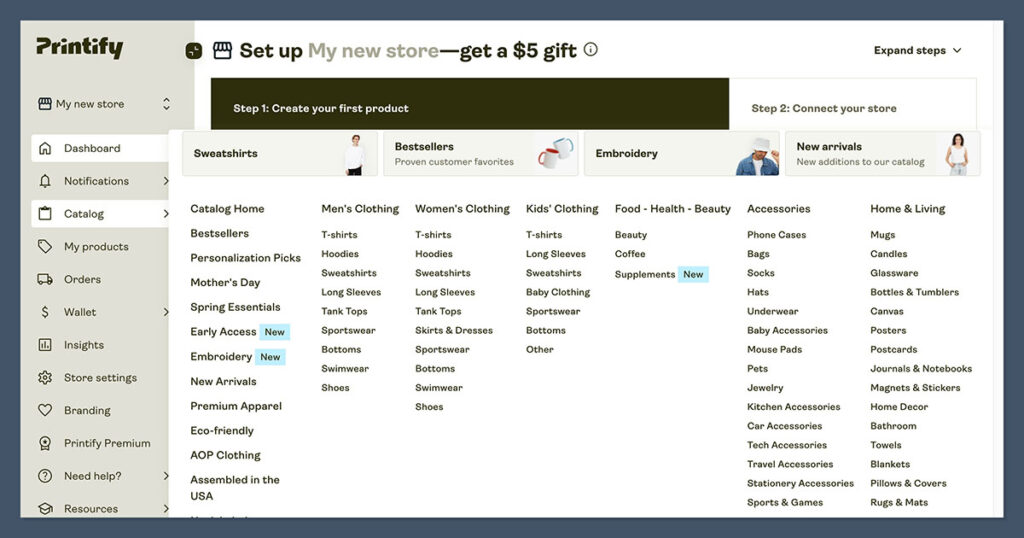
If you’re looking for flexibility and variety, Printify takes the lead.
With over 750 products in its catalog, Printify gives you access to:
- T-shirts and hoodies from multiple brands
- Mugs, posters, blankets, phone cases
- Niche items like pet accessories, shoes, and bags
You can choose from dozens of providers for a single item type, which gives you pricing and location flexibility.
But be aware: quality can vary depending on the print provider you select.
This level of variety makes Printify ideal for experimentation.
If you’re testing different niches, targeting multiple audience segments, or planning seasonal product rotations, the extensive catalog gives you all the tools to move fast.
You don’t need to commit to a product line or brand direction upfront — which is a real advantage in early-stage ecommerce.
Printify Pros:
- Massive catalog
- Multiple suppliers per product
- Fast setup and publishing
- Integrates with Shopify, Etsy, WooCommerce, and more
Printify Cons:
- Inconsistent quality across providers
- Branding options are limited or unavailable with most suppliers
In contrast, Apliiq’s catalog is smaller and limited to apparel, but that’s by design.
Best for Branding and Customization: Apliiq
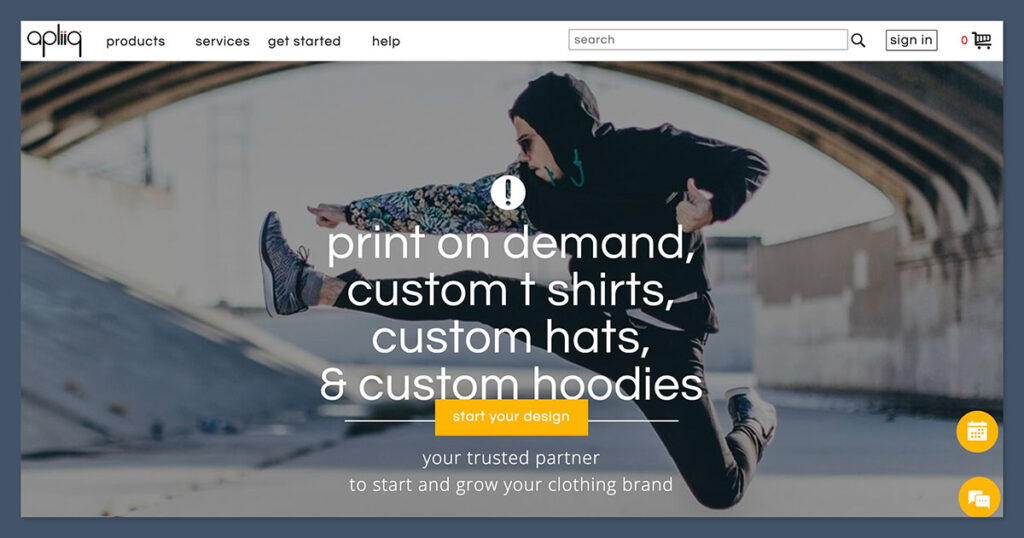
Where Printify emphasizes speed and variety, Apliiq is focused on brand-first customization.
Apliiq’s entire platform is designed for creators who want to launch a real clothing line, with in-house production, private labeling, and fashion-grade branding features.
Here’s what I could customize when testing Apliiq:
- Embroidered designs (front, sleeve, back, hood)
- Woven neck labels
- Hem tags and fabric labels
- Custom appliqué and cut-and-sew patches
- Private label branding from day one
It’s one of the few POD services where your final product feels like a genuine clothing brand — not just another Shopify store.
One standout feature is that once you upload and approve your woven labels, Apliiq stores them in their facility for future use.
This creates a more scalable branding system — your label is applied automatically to each item without needing extra effort.
For anyone looking to build a consistent product line with long-term brand value, this is a major asset.
Apliiq Pros:
- True private label apparel
- Consistent, in-house production
- Excellent embroidery and label options
- Real fashion branding experience
Apliiq Cons:
- No non-apparel products
- Only integrates with Shopify
- Takes more time to set up and sample
If you’re creating a product with long-term brand value, Apliiq is the better choice — even if it takes more effort to get started.
Best for Pricing and Margins: Printify
Both platforms charge per product sold, with no upfront costs, but Printify gives you more control over pricing and margin.
Printify Pricing:
You can select providers based on price, and if you subscribe to Printify Premium ($29/month), you get up to 20% off product costs.
Example Pricing (with Printify Premium):
| Product | Standard Price | Premium Price |
|---|---|---|
| Bella + Canvas 3001 Tee | $9.25 | $7.40 |
| Ceramic Mug | $5.45 | $4.35 |
| Gildan Hoodie | $17.99 | $14.39 |
This model is ideal for price-sensitive sellers and those testing large product volumes.
With Printify, you can also strategically mix suppliers to maximize margin across product categories.
For example, you could use a low-cost provider for mugs while opting for a more premium partner for apparel — all within the same store.
This type of flexibility makes it easier to scale profitably, especially in high-competition niches.
Apliiq Pricing:
Apliiq’s pricing is higher, but includes more branding services. You pay extra for:
- Woven label setup and storage
- Per-item label application
- Embroidery or patch customization
Example Pricing:
| Product | Base Price | With Embroidery | With Label |
|---|---|---|---|
| Cotton Tee | $12.00 | $16.00 | $17.50 |
| Premium Hoodie | $28.00 | $35.00 | $37.50 |
You’ll likely earn higher margins with Printify, but Apliiq’s pricing makes sense if your product commands a premium due to branding.
Best for Shipping and Global Reach: Printify
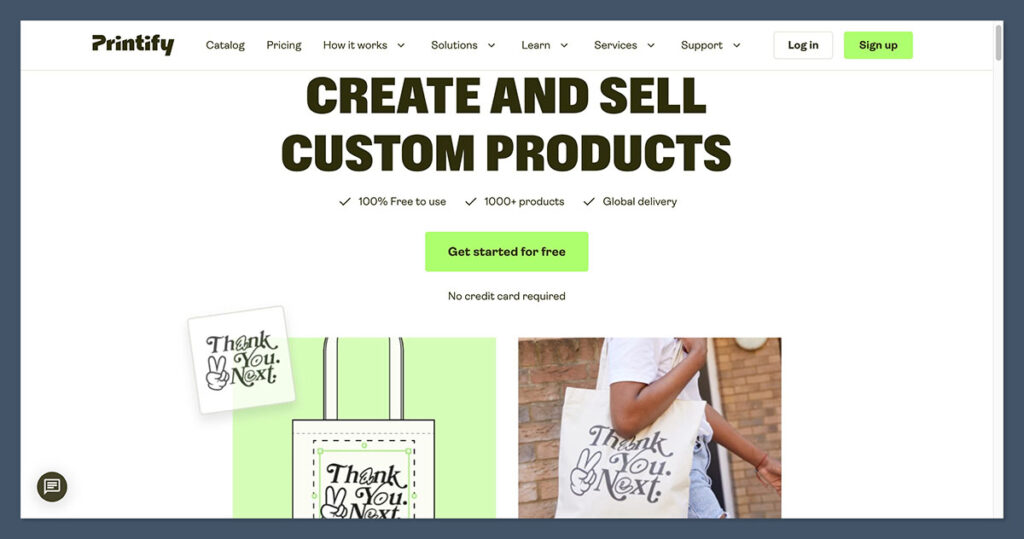
Printify wins for international reach and shipping speed — depending on the provider.
Printify:
- Global network of providers
- Multiple shipping options
- Estimated 3–7 day delivery for US orders
- International shipping can take 10–21 days
Since some providers operate in different regions, you can choose fulfillment partners closer to your customers to reduce delivery times.
What also helps is that many Printify providers have print facilities in both the US and Europe.
This allows for localized shipping, lower customs risk, and faster international delivery — something not possible with US-only fulfillment models.
If you’re building a global customer base, this flexibility gives Printify the clear advantage.
Apliiq:
- All orders ship from Los Angeles or Philadelphia
- 5–7 day production + 3–5 day US delivery
- International shipping is available but slower and more expensive
If your customer base is primarily in the US, Apliiq’s fulfillment centers do the job well. But Printify offers more flexibility globally.
Best for Platform Integrations: Printify
Printify supports a wider range of ecommerce platforms.
| Platform | Printify | Apliiq |
|---|---|---|
| Shopify | ✅ | ✅ |
| Etsy | ✅ | ❌ |
| WooCommerce | ✅ | ❌ |
| eBay | ✅ | ❌ |
| Wix | ✅ | ❌ |
| Squarespace | ✅ | ❌ |
If you want to sell on Etsy, WooCommerce, or eBay, Printify is the better choice.
Apliiq currently only supports Shopify, which could be limiting if you plan to sell across multiple channels.
This makes Printify a strong fit for sellers using marketplace-first strategies.
It also allows for easier multi-channel scaling — you can sell the same product catalog on multiple platforms with a single backend integration.
For sellers who rely on Etsy or WooCommerce traffic, Printify is the clear pick.
Best for Ease of Use: Printify
Getting started with Printify is faster and simpler.
Printify Setup Experience:
- Signup takes a few minutes
- Upload design, choose product and provider, publish
- Product mockups auto-generated
- Wide selection of pre-integrated products
It’s designed for speed, even for first-time sellers.
Apliiq Setup Experience:
- Takes more time to configure labels, embroidery, and brand assets
- Requires more sampling and testing
- More decisions to make upfront (materials, label placement, etc.)
The interface is easy enough to use, but launching a store takes longer — because there’s more to customize.
Printify’s step-by-step setup is straightforward, and the learning curve is minimal.
Even without previous ecommerce experience, it’s easy to launch a store the same day.
Apliiq, by contrast, has more moving parts — which is a benefit for brand builders, but adds complexity for beginners.
Best for Product Quality and Consistency: Apliiq
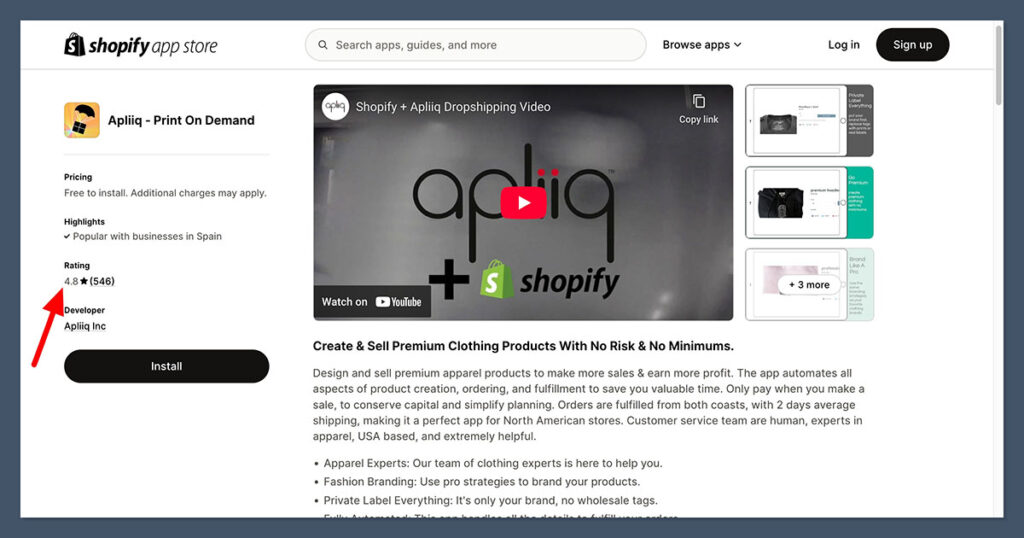
This is where Apliiq really shines.
Printify:
Product quality depends on the supplier. Some deliver great results, others not so much. There’s no consistent baseline across all providers.
Apliiq:
Since everything is printed, embroidered, and shipped in-house, quality control is consistent.
- Stitching and label placement were accurate in all tests
- Embroidery detail was precise
- Fabric weight matched product specs
This is one of the few POD services where sample orders consistently matched the production-level quality you’d want to deliver to customers.
It’s also worth mentioning that Apliiq uses higher-end blanks by default.
Brands like AS Colour and Independent Trading Co are commonly used, which are known for better durability and fit.
For apparel brands prioritizing long-term customer satisfaction, this level of consistency is essential.
Best for Long-Term Brand Building: Apliiq
If you’re thinking beyond just selling merchandise — and instead, building a fashion label or brand with equity — Apliiq has the structure to support that.
You can create a clothing line with:
- Custom labels
- Embroidered branding
- Consistent packaging
- Bulk pricing options
The customer receives a product that looks like it came from a real fashion house — not a print-on-demand warehouse.
Because Apliiq allows you to create your own branded experience from the inside label to the packaging, the end result feels more like a boutique fashion brand than a POD operation.
If long-term customer loyalty and perceived value are your goals, Apliiq offers tools that help build a real foundation.
Who Should Use Printify?
Choose Printify if:
- You want to test product ideas fast
- You’re running a general store (tees, mugs, etc.)
- You’re selling on multiple platforms (Etsy, eBay, WooCommerce)
- You want low-cost entry and flexible providers
Printify is especially well-suited for sellers who are still exploring what works.
If you’re in the validation stage — testing niches, experimenting with designs, or building MVPs — Printify makes it easy to launch quickly without committing to a specific direction.
It’s also ideal for seasonal sellers, side hustlers, or anyone looking to spin up multiple stores without investing in brand infrastructure upfront.
Who Should Use Apliiq?
Choose Apliiq if:
- You’re building a branded fashion label
- You want embroidery, labels, and private packaging
- You’re on Shopify and selling apparel exclusively
- You care more about brand consistency than speed
Apliiq is ideal for founders and creatives who see their business as more than just ecommerce — it’s for those treating their store as a real brand from day one.
If you’re planning product drops, want a cohesive aesthetic across all SKUs, or are trying to build long-term customer loyalty through quality, Apliiq offers the tools that make that vision possible.
It’s a slower start — but one with more lasting potential.
Final Verdict
| Category | Winner |
|---|---|
| Product Variety | Printify |
| Branding & Customization | Apliiq |
| Pricing & Margins | Printify |
| Shipping & Global Reach | Printify |
| Platform Integrations | Printify |
| Product Quality | Apliiq |
| Long-Term Brand Building | Apliiq |
| Ease of Use | Printify |
The bottom line:
- Use Printify if you’re looking for scale, speed, and flexibility
- Use Apliiq if you’re building a serious clothing brand with long-term value
Both platforms are strong — the right one depends entirely on what you’re building.
If you’re still unsure, start small.
Test a few designs through Printify to validate demand, and once you know what’s working, transition those winners into a fully branded collection using Apliiq.
It doesn’t have to be either-or — many successful businesses start with one and grow into the other.

